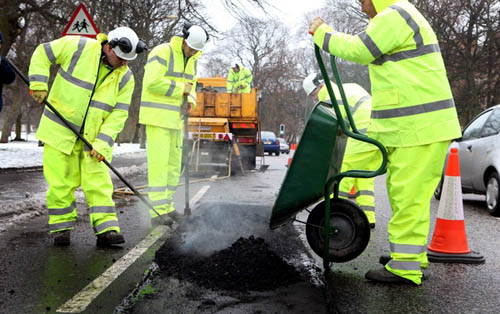SCOTLAND’S “Traffic Cone Tsar” is facing calls for the chop after spending over £1m to dish out fines worth just £90,000.
The £300,000-a-year office of the Scottish Road Works Commissioner was set up by the Government in 2005 to monitor roadworks firms and fine those responsible for delays and shoddy work.
But the office of the Cone Tsar has been branded a waste of money after fining just four firms a total of £92,500 since 2007.
When the commissioner’s post was first set up, the then transport minister Tavish Scott declared: “This appointment will play a vital role in ensuring there is minimum disruption caused by road works across the country.”
The commission itself claims to “improve the planning, co-ordination and quality of road works throughout Scotland” by encouraging good practice across both utility companies and roads authorities.
But the sheer number of roadworks in Scotland, and the way they are managed, leave many motorists seething.

Murray Fleming, treasurer of the Scottish Taxi Federation, said he felt the office’s budget would have been better spent repairing the country’s roads.
He said: “There have been no obvious signs of improvement to the roads in the past five years. All the problems we had as a cabbie then, we still have now.
“There does not appear to be any effective long-term planning or co-ordination. Taxi drivers know the alternate routes to take when they are planning their journey, but time after time these routes are also full of road works.
“I think £1.1million would be better spent filling in some of the pot holes.”
Neil Greig, director of policy at the Institute of Advanced Motorists, said: “The IAM has been very disappointed by the performance of the Roadwork’s Commissioner in Scotland. What looked like an excellent move to provide a ‘drivers champion’ has had little impact on the ground and no obvious benefits in reduced frequency or higher quality of roadworks.
“Far from being on the frontline inspecting actual holes in the road the Commissioner’s main role appears to be to administer the electronic roadwork’s register. Most fines are issued for technical breaches of advertising and consultation regulations rather than broken traffic lights, poor signposting, overrunning works or plain poor workmanship.
“The new Commissioner must adopt a much higher profile and show that they are now clamping down on poor quality work that cost motorists more in the long run in delays, wasted resources and damage to vehicles.”
Robert Oxley, Campaign Manager of the TaxPayers’ Alliance added: “This is yet another well paid quangocrat performing a non-job and not a very effective one at that.
“An incredible amount of taxpayers’ money is being pumped into the commission for not much in return. Its time this quango was no longer given the green light to waste money and instead was axed.”
However, the Cone Tsar has received support from motoring organisation the AA, saying the commissioner deserved praise.
He added: “You could argue that the reason there wasn’t many prosecutions was because he was there. The fact there is an official there is a good thing.
“I know that many local authorities in England would like to see a similar commissioner appointed.”
The first £60k-a-year commissioner, former road engineer John Goody, imposed the £92,500 fines between taking up the job in 2007 and finishing his five-year appointment last year.
New commissioner, Elspeth King, who was appointed in January this year, defended the commission, saying penalties were just a small fraction of the department’s work.
She said: “The penalties are just a small fraction of the statutory duties I undertake as commissioner.
“I only took on the job last month and I haven’t issues any penalties. Penalties are only issued to companies with a systematic record of non-compliance with legislation.
“Perhaps to the public at large it may seem like a small number, but we cannot issue penalties willy-nilly, that’s not what we do.”
She added: “Road works are necessary. If you don’t have them then roads are going to fall apart.
“In my role, I am very interested in how they are delivered on the ground and what effect they will have.
“My role is to take a strategic view on how the main players are managing road works – to look at what they are doing to make sure correct procedures are being undertaken.
“We are such a small organisation and it would not be possible to check every single road work in the country.”

